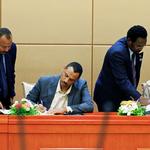ARUS research contributes to end child marriage in Sudan
“ We have used the ARUS reports on child marriage in our awareness raising to end the practice in eastern Sudan. We raise awareness through coffee gatherings in local communities to speak about the drivers of child marriage and ways in which it is harmful. We use the findings from the research, and by distributing the written reports it gives strength to our message”
Ilham Osman Ibrahim, SORD
Child marriage is a grave violation of human rights, sometimes with a deadly outcome for young girls that are forced into marriage with much older men. Every year, 15 million girls around the world are married before they turn 18. The harmful practice is most common in African countries. One of them is Sudan where 34 per cent of girls are married before the age of 18. In Eastern Sudan, where the ARUS project has conducted its research, the prevalence of child marriage vary from 32 per cent in Red Sea state, to 45 per cent in Kassala and 49 per cent in Gedarif.
Sudan’s laws facilitate and encourage child marriage, giving it an Islamic legitimacy.
In Sudan, child marriage is legal. The Muslim Personal Status law, which was codified in 1991 under the Islamist-Military regime of Omar al-Bashir (1989-2019) states that girls as young as 10 years old can be married. The practice was defended because it is claimed to be rooted in Islam. Besides setting the age of marriage at puberty, which is in a Sudanese legal context interpreted at 10 years, prevents immorality. Despite international and domestic pressure to make 18 the minimum age for marriage, the Muslim Personal Law has remained unchanged even during the short-lived transitional period under the leadership of Abdallah Hamdok. Although Sudan has ratified the Convention on the Rights of the Child, it has failed to comply with its recommendation to set 18 as the minimum age of marriage.
The legalization of child marriage within the frame of Sharia has made it challenging for women’s rights organizations to advocate against it. Their work has been regarded as opposition to the Bashir regime and to Islam itself. It even made the ARUS research on the topic challenging.
Tradition trumps negative health consequences
Child marriage has been one of the top priorities of the ARUS research agenda since the second phase of the programme started in 2018. Together with our Sudanese partners in Khartoum and at the three regional universities in east Sudan we have worked extensively on this sensitive issue in order to shed light on the drivers of the harmful practice, the relationship between child marriage and education and local perceptions of child marriage interventions.
We have interviewed the families and girls that are affected in urban and rural areas of eastern Sudan, the advocates for and against child marriage, the NGO staff who work on child marriage interventions, the legislators and policy makers. The findings suggest that there are several causes that contribute to child marriage in eastern Sudan, including poverty, lack of education for girls, avoiding stigma of ‘bayra’ (“not demanded for marriage”) and the legality of child marriage. However, tradition and protection of girls’ chastity and morality emerged as the most important driver across the three eastern Sudanese states, including in poor and rural areas. Girls are forced to marry early because they are stereotyped as being prone to premarital sexual relations which would be damaging to the family and community’s honour. Protecting girls from immoral behaviour (sutra) is the clearest motivation behind the continuation of child marriage in eastern Sudan.
Another important finding that emerged, was that intervention messages and methods used by NGOs were culturally insensitive, and sources were not considered credible by those in a position to argue for change. The practicing communities were increasingly aware of the negative health consequences, but tradition trumps the young girls’ health. Ultimately, child marriage is not about protecting the girls, but about shielding the families from stigmatisation and dishonour.
Our research has resulted in a multitude of reports and policy briefs, the first of its kind in the eastern Sudanese context. These reports and policy briefs have been distributed on the local and national level in Sudan, both in Arabic and English, to NGOs and policy makers.
Research with an impact
Based on our research, we have organized workshops with local communities and held national meetings where, for example, ARUS researchers from Eastern Sudan have presented their findings to the National Council of Child Welfare. The organization of the ARUS programme itself, with a focus on including regional universities and an emphasis on networks and frequent dialogue meetings with both NGOs and local government representatives, amplifies the effect and impact locally.
Research is given a lot of weight in the Sudanese context, and ARUS research has been used as a tool for awareness raising and advocacy. A local NGO in red sea State, Etinaina, has used ARUS report to design a new project combating child marriage in the region. The project was subsequently launched as it received funding from Italian Cooperation. The ARUS reports on child marriage from Gedarif and Kassala were likewise used by the national organisation Sudan Organization for research and development (SORD) in their projects in the two states to train staff to inform awareness raising through coffee gatherings/sessions at the community level. In 2021, to mark the International Women’s Day, the ARUS report on child marriage in Gedarif was distributed as part of a campaign to end child marriage in the region.
The spread and use of ARUS research shows that our researchers are a voice to be reckoned with in debates about child marriage. Testimony to the impact of ARUS research is also the frequent citations in documents and reports on for example the level of the United Nations (UN). Our research has been cited in the UN High Commissioner for Human Rights report ‘Child, early and forced marriage in humanitarian settings’, in a UN Security Council briefing on Sudan, and in the UNFPA Sudan publication ‘Voices from Sudan 2020: A qualitative assessment of gender-based violence in Sudan’. Our research is also featured in the Girls Not Brides report on Sudan.
ARUS research is widely shared on knowledge and research hubs like the Relief web and OCHA.
Signs of change
There are signs that child marriages are slowly declining in parts of the world. Also in Sudan, women’s rights activists have come a long way towards raising more awareness about the drivers of child marriage. They have done so with an inexhaustible energy and determination, backed up by knowledge and research from the ARUS team and other academics.
According to UNICEF’s Sudan country briefing there appears to be a slight decrease in the number of the youngest girls who are forced into early marriages. Our research from Kassala, Algadaref and Red Sea State in Eastern Sudan confirms that attitudes are slowly changing, and also tells the story about why.
Education is regarded as one of the most important factors in delaying the age of marriage for girls. There is reason to believe that the decline in child marriage among girls under the age of 15 in a number of African countries is (at least partly) linked to more girls going to school. The practice of child marriage in eastern Sudan has been coupled with a belief that girls’ education constrains their marriage potential. Avoiding the stigma of ‘bayra’ (“not demanded for marriage”) for girls remain a key reason for keeping girls out of school. However, attitudes towards girls’ education are changing and this is seen as a step in the right direction. Our research shows that despite limited educational structures and a negative social attitude towards girls’ education, families are increasingly supporting their girls in continuing their education.
"There is a change in the attitude of men. Many now prefer educated women, as they expect that education helps them to raise children better than uneducated girls."
Interviewee from Gedarif
Publications

Child marriage and education in Eastern Sudan
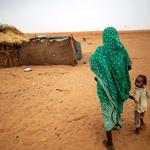
Community Views on Child Marriage in Kassala: Prospects for Change
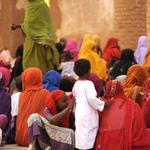
Drivers of child marriage in eastern Sudan
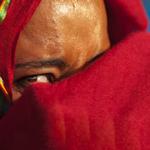
Interventions for the abandonment of child marriage in Sudan
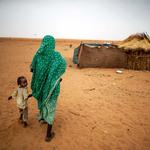
Traditional, but changing, cultural norms: Rural community views on child marriage in Algadaref State, Sudan
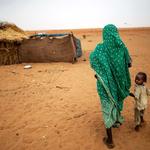
Girls, Child Marriage, and Education in Red Sea State, Sudan: Perspectives on Girls’ Freedom to Choose
Liv Tønnessen
Project
